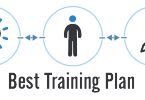There are two ways of approaching aerobic training for power athletes, or clients who are looking to gain muscle mass:
1) Avoid it altogether
OR
2) Do the minimum to gain health benefits, without harming muscular gains.
But are those the only options?
Does Aerobic Training Maximize or Minimize Muscular Gains?
The results from a Swedish-Spanish study published in PLos One a few weeks ago suggest there is actually a third way of seeing it: Aerobic training can be used to optimize muscular gains.
Surprised?
You should be!
This new research directly counters many other studies that have been done over the past 35 years. In fact, the first study revealing that aerobic training could interfere with strength training, compromising the muscular adaptations, was published in 1980. Numerous studies, even a meta-analysis, have since corroborated this finding.
Researchers have even found a biological explanation for the negative impact cardio training has on muscle building: AMP-activated protein kinase (AMPK) is activated after endurance training, which has been shown to reduce the effectiveness the muscle protein synthesis pathway.
In other words, endurance training blocks muscle building.
But now, 36 years later, the new study suggests that aerobic training does not decrease, but rather increase muscular gains.
Let’s take a closer look at this new study.
How the Research Study Was Conducted
Sixteen healthy young men performed resistance only training sessions or mixed sessions (composed of continuous or interval cycling followed, after a 10-min break, by resistance training).
Each group performed 21 training sessions over 7 weeks.
Maximal strength and aerobic fitness tests, along with muscle biopsies were performed before and after the 7-week training protocol in order to track training adaptations.
What the Research Revealed
Without surprise, the cardio group improved aerobic fitness (VO2max, endurance, and aerobic enzymes). But, some of the other findings were more surprising…
- Both training regimens resulted in the same increase in muscle strength (a 30% increase), so there was no negative impact of adding endurance exercise on muscle gains;
- Combined endurance and resistance training resulted in a larger muscle fiber hypertrophy and enlarged the area of both Type I and Type II muscle fibers (while resistance training increased only the area of Type II muscle fibers);
- Adding endurance before resistance training further activated the muscle protein synthesis molecular pathway.
In short, performing endurance training before strength training allows a greater increase in muscle fibers hypertrophy and an identical increase in muscle strength.
These results are the exact opposite of previous findings and at least one other study has now supported these recent results.
One Caveat to Keep in Mind
In real life most people do not usually compensate for energetic expenditure by eating a supplement after training. Your clients likely aren’t eating anything during their training sessions.
In the study however, the participants in the cardio group were given a protein supplement, with addition of maltodextrin. A proper nutritional recovery strategy is probably an important aspect for preventing impaired strength adaptations when performing endurance activities before resistance training.
So is it time to change our way of seeing endurance training for strength athletes and clients wishing to gain muscle mass?
Maybe, but there are still important questions to answer before recommending endurance training before strength training in order to enhance muscle benefits.
Reference:
Kazior et al. (2015) Endurance Exercise Enhances the Effect of Strength Training on Muscle Fiber Size and Protein Expression of Akt and mTOR. PLoS One, 11(2):e0149082: http://journals.plos.org/plosone/article?id=10.1371/journal.pone.0149082




